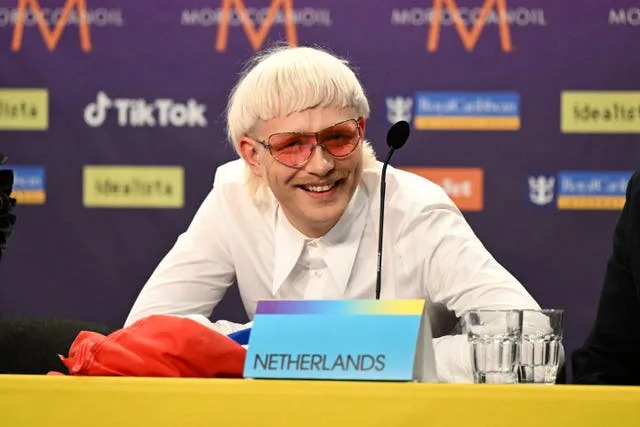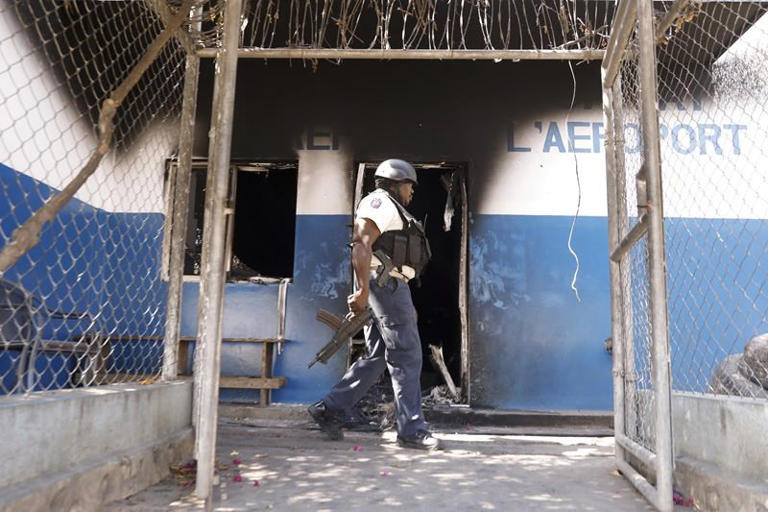
Sat, May 11, 2024
TT News Agency/Johan Nilsson via Reuters
Climate activist Greta Thunberg was detained by Swedish police in Malmö on Saturday for attending a pro-Palestinian protest outside the Eurovision venue.
Thunberg, who was wearing a keffiyeh, was escorted away from the event by the cops, according to footage from the incident. Police said in a statement that they had “handled a number of unauthorized public gatherings” and taken several people into custody, but it was not immediately clear if Thunberg was among them or faced any charges.
“I’m here to show we think it is outrageous and inexcusable for Eurovision to let Israel participate while committing a genocide,” Thunberg said in a statement.
The demonstration was organized to protest the participation of Israel in the Eurovision contest while Israel is waging war in Gaza. Israeli singer Eden Golan, 20, qualified to participate in the 68th edition of the song contest earlier this week.
Golan had been met with a chorus of cheers and boos in dress rehearsals and the semi-final on Thursday, the BBC reported.
“It is truly such an honor to be here on stage, representing [Israel] with pride,” Golan said.
Israel’s onslaught against Gaza, part of an effort to root out Hamas terrorists following the Oct. 7 attack on Israel, has killed over 30,000 Palestinians, most of whom are women and children, according to Gaza’s Health Ministry. The protest coincides with Israel planning a ground offensive in Gaza that the United Nations has warned will be a slaughter. U.S. President Joe Biden and his aides have been urging Israeli Prime Minister Benjamin Netanyahu in phone calls and meetings to consider other courses of action given that Israel’s current plan to blast through Rafah will inevitably harm civilians.

Demonstrators hold signs and Palestinian flags, as people protest against Israeli participation in the Eurovision Song Contest.
(REUTERS/Leonhard Foeger)
Israeli authorities earlier Saturday ordered Palestinians to evacuate from more regions of Rafah, the southern city where Israel had forced civilians to go for safety earlier in the war.
Student movements around the globe have kicked off a series of protests against Israel’s war in Gaza, from Columbia University in New York to Cambridge in the U.K. and hundreds of other schools. Police have cracked down on protests, leading to thousands of arrests.

Protesters march during the Stop Israel demonstration against Israel's participation in the 68th edition of the Eurovision Song Contest (ESC).
(TT News Agency/Johan Nilsson via REUTERS)
“STOP USING Eurovision TO WHITEWASH THE ISRAELI CRIMES,” one sign protesters carried at the Malmö protest read.
Another read “WELCOME TO GENOCIDE SONG CONTEST,” alongside an image of a heart dripping red ink like blood.
Tens of thousands of pro-Palestinian demonstrators were expected to partake in the protest, waving Palestinian flags, the police stated earlier.
Stephanie Kaloi
Thousands took to the streets in Malmö, Sweden to protest the Israel-Hamas war and the decision to allow Israel’s contestant Eden Golan to compete in the Eurovision Song Contest and its Saturday final. Some estimates said there were more than 15,000 protesters, though police pegged the demonstration at between 6,000 and 8,000 demonstrators. Israel and Golan ended up finishing in fifth place, with Switzerland ultimately taking home the victory, though Israel took a brief lead with a strong showing in the fan vote as the votes were announced.
In video shared on social media, protesters chanted “We will crush Zionism” and “There’s only one solution — Intifada revolution.”

Swedish climate activist Greta Thunberg (C) wearing the keffiyeh scarf is removed by police during a pro-Palestinian demonstration outside the Malmo Arena venue ahead of the final of the 68th Eurovision Song Contest (Getty Images)
Protestors in Malmö include Greta Thunberg, who previously joined thousands of people in the city’s streets on Friday. Photos and video of Thunberg being arrested by police was shared on social media by news account Visegrád 24.
The account captioned a photo of Thunberg being pulled away by two officers, “Greta Thunberg being dragged away by the Swedish police to one of their police cars. Greta is a repeat offender and had been detained and sentenced multiple times over the pasts year and a half.”
On Friday, Thunberg tweeted, “Malmö says NO to genocide! People from all over Sweden are gathering in Malmö this week, where Eurovision is taking place, to protest against Israel’s participation in the competition and to demand a #FreePalestine and #CeasefireNow!”
“Yesterday we were tens of thousands people flooding the streets of Malmö. We will not accept that a country currently committing genocide is allowed a platform to artwash themselves. The world cannot remain silent in a genocide. Everyone who can must use their voice and speak up against Israel’s crimes and occupation,” she continued.
You can watch the music video for the Eurovision winning song from Switzerland’s Nemo, “The Code,” below:
Golan is not without supporters. Ahead of her performance on Saturday night, Israeli actress Gal Gadot video chatted with the young singer. In a video shared by author Hen Mazzig, Gadot told Golan, “Just give love, love, love and get on stage just like yesterday, strong, and you don’t lose yourself. You’re amazing! That’s our victory. You’ve already won.”
“You know, I faced so many haters and my movies being boycotted in some countries who didn’t want the movies because of me. It doesn’t matter. It doesn’t matter at all,” the “Wonder Woman” actress continued. “The haters are the ones losing. We have the entire world to win over.”
Despite protests that saw more than 10,000 people turn out against Israel ahead of Golan’s performance Thursday, Israel advanced to the finals and is currently one of the favorites to win the event, with bookers ranking her second behind Croatia’s Baby Lasagna. Golan was met with boos before, during, and after her performance in the semi-finals and again Friday night during rehearsals.
The finale round will begin at 9 p.m. Central European Summer Time (3 p.m. EDT).
Though organizers of the 68th Eurovision contest have attempted to keep politics out of the event as per usual, tensions have been simmering since Eden Golan’s song “October Rain” was approved for the competition. This year’s Eurovision has taken place as the Israeli-Hamas war has continued to bring devastation to Gaza.
Israel’s security agency Shin Bet ordered Golan to remain in her hotel room on Saturday ahead of the final after thousands of people staged a protest outside.
Golan has also been met with disdain from her fellow contestants. On Friday, Greek contestant Marina Satti pretended to fall asleep as Golan answered questions from reporter about her song. TV journalist Miha Schwartzenberg shared a video online and tweeted, “This is Greece representative singer at @Eurovision , @marina_satti .An embarrassment for Greece and for every decent #Greek person.”
“Pretending to fall asleep while the Israel’s contestant is speaking is not just bad education or pure jew-hatred,but also a stain over the greek nation she represents in front of the world,” Schwartzenberg added.
Irish contestant Bambie Ray Robinson, known by their stage name Bambie Thug also complained about commentary from Israel’s Kan, the country’s public broadcasting corporation, only hours before Saturday’s final.
They wrote in an Instagram Story, “There was a situation while we were waiting to go to stage for the flag parade rehearsal which I felt needed urgent attention from the EBU—the EBU have taken this matter seriously and we have discussed about what action needs to be taken.”
On Tuesday, Kan had warned its viewers that Bambie Thug’s performance of their song “Doomsday Blue” would be “the most scary” of the night. “There will be a lot of spells and black magic and dark clothing, Satanic symbols, and voodoo dolls, like we are at Cats Square in Jerusalem in the mid-90s,” the commentator said in reference to a public square in Jerusalem that was home to goth culture in the 1990s.
The commentator added that Bambie Thug liked to “speak negatively about Israel.”
On Saturday, Bambie Thug told RTÉ News, “I’m angry with other teams breaching their rules of the EBU, and still being allowed in. So there’s definitely a war drum sounding in my heart to push the performance even more than I have done before.

















